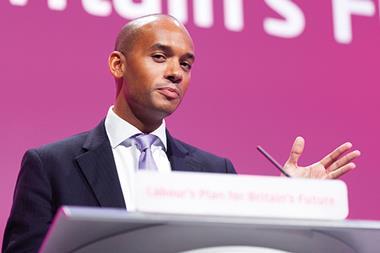Housing was always expected to play a key role in the run up to the general election, but I’m not sure anyone appreciated just how key it would be. They do now.

As vote grabbers go, they don’t get much more grabby than the self-anointed party of working people’s (aka the Conservatives’) pledge to extend right to buy to 1.3m housing association tenants - presumably winning their votes in the process.
I think we’re all agreed that the real solution is to build more homes and the proposals have predictably been met with by anger from the housing associations, which are threatening to take the government to court. But as Property Week columnist Steve Norris notes, the fact private tenants don’t enjoy the same right doesn’t mean that the right to buy shouldn’t be extended to more tenants, particularly when the receipts could provide many more affordable homes.
Residential Land chief executive Bruce Ritchie also believes the proposal has some merit. “It’s a clever move giving the housing associations cash that the government doesn’t have,” he says. However, he highlights a potential anomaly: “You could find people living in expensive homes for a relatively short period of time being given 30% discounts that are to the detriment of the funds the registered social landlords would normally expect to receive upon an asset sale. This in turn might push the RSLs to keep their highest value stock empty and for sale.”
It would, as he says, need to be “delicately handled” and certainly has not been greeted with universal support from the wider industry, with many questioning whether it would add to the housing crisis rather than help tackle it. But at least it will win votes.
One or two of Labour’s proposals - highlighted in an interview with shadow business secretary Chuka Umunna in this week’s issue - are also blatant attempts to woo voters. But you can’t imagine that mansion tax would win many votes in London or among the elderly asset rich/cash poor and you have to question the sense of abolishing non-dom status. What message does it send to foreign capital? London is the world’s capital partly because of it. As for the Lib Dems, they’re promising 10 garden cities and rent to own is interesting, but ultimately is anyone really bothered?
The good news is devolution was a prominent theme in all the manifestos, so whoever gets in, the regions look set to enjoy greater power over their own affairs.
Off market off the scale?
Are more off-market transactions happening at the moment? We report on a £90m off-market swap deal in London’s West and there does seem to have been a particular increase in off-market deals in the shopping centre market. You can see why that might be. Most of the deals are equity rather than debt led and private equity firms don’t muck around. They come in and buy quickly.
CBRE UK managing director Ciaran Bird acknowledges they happen, but says they are not so much off-market as one-on-one approaches. The sheer heat of the market at the moment means there is more traffic direct and via agents as parties try to proactively source opportunities, he says, a point echoed by DTZ chief executive EMEA, John Forrester, who adds that there’s a difference between ‘not marketed’ and ‘off market’ and claims there are in fact hardly any true one-to-one off market deals. “It is simply that the vendor’s adviser - if they are good - will know the three hottest buyers at any given time and those three or so will move heaven and earth to buy before a deal has been ‘marketed’,” he says.
In short, when so few opportunities knock, the opportunists start knocking.





























No comments yet